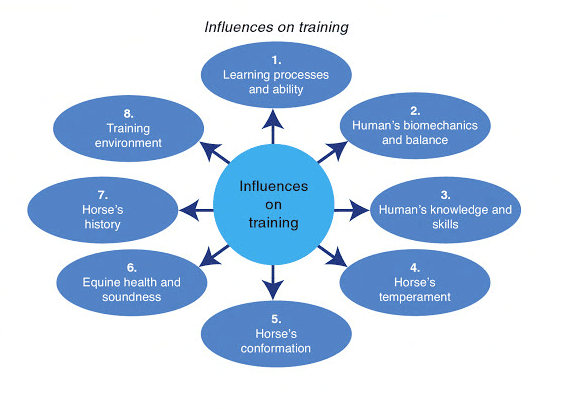This article provides an introductory look at the field of scientific research and education known as “equitation science.” It introduces equitation science and how it relates to and informs a better understanding of digestive health for horses in work. We will continue to explore this topic in ongoing posts; be sure to follow SUCCEED Equine on Facebook and sign up for our enewsletter for future articles and further discussion.
Any time a human comes in contact with a horse, the horse is changed. Some human interventions are simple and clearly beneficial, like providing safety from predators and access to dental, hoof and veterinary care. Others that are seemingly normal to us, like keeping horses stalled and feeding grain, are significant departures from equine nature. The effects of our husbandry practices and usage impact horses mentally, behaviorally and physiologically.
There’s a wide spectrum of approaches in equestrian philosophy from “win at any cost” to “welfare at any cost.” But the happiest horses and riders, and the most successful, tend to fall somewhere in the middle. This probably describes you, whose goals are to enjoy riding and doing well at the shows by way of positive relationships with healthy horses.
We call this “doing right by the horse.”
This approach is supported by an emerging field of research called “equitation science.” Developed throughout the last decade, researchers are working to understand, scientifically, how improving equine welfare affects outcomes in training and performance (and vice versa). Currently, studies have focused primarily on riding principles, such as leg and bit pressure, and learning theory to improve welfare in horse training. However, we also know that equine welfare begins with the basics of husbandry – daily care, feeding and the like. Thus, understanding and supporting digestive health is a key consideration in the equitation science model.
For years we have preached that emphasizing welfare, and digestive health specifically, is essential to getting the best from your horse. Equitation science studies are revealing, with strong physical evidence, not just how important welfare is but why.
Understanding the basics of equitation science can inform your approach to horsemanship while offering a deeper understanding of the relationship between the horse’s digestive health and performance.
 Notice the sixth item on the list: equine health and soundness. While the majority of the work in equitation science to date has prioritized learning processes, environment, and human biomechanics, balance, knowledge and skills, the health of the horse is a key component that must also be explored.
The fact is, no amount of right riding and handling can make up for performance issues related to a horse’s poor, or even sub-optimal, health.
Digestive health is central to overall health, especially for the horse that needs to be able to perform. A horse’s gi tract health influences:
Notice the sixth item on the list: equine health and soundness. While the majority of the work in equitation science to date has prioritized learning processes, environment, and human biomechanics, balance, knowledge and skills, the health of the horse is a key component that must also be explored.
The fact is, no amount of right riding and handling can make up for performance issues related to a horse’s poor, or even sub-optimal, health.
Digestive health is central to overall health, especially for the horse that needs to be able to perform. A horse’s gi tract health influences:
 In a published paper on “Ethical equitation: Applying a cost-benefit approach,” McGreevy summarizes some of the issues:
In a published paper on “Ethical equitation: Applying a cost-benefit approach,” McGreevy summarizes some of the issues:
Introducing Equitation Science
For the benefit of American readers, we need to re-define the term “equitation.” While it has been repurposed to typically refer to “rider position and aids” on the show circuit, the original and worldwide definition describes the more general “act or art of riding horseback.” Equitation science is the application of scientific methods to assess objectively the welfare of horses undergoing training. The field has been developed and promoted by Dr. Andrew McLean, an Australian eventer and veterinarian, and Dr. Paul McGreevy, professor at University of Sydney. Their work gave birth to the organization International Society for Equitation Science (ISES). ISES advises the Fédération Equestre Internationale (FEI), the governing body for international horse sports, and provides university coursework, training and clinics throughout the equine industry. Visit the ISES website to learn more about this field, the organization and the 10 core principles of equitation science.Linking Equitation Science and Equine Digestive Health
Drs. McLean and McGreevy’s 2010 book, Equitation Science, describes eight factors that influence welfare and success in horse training: Notice the sixth item on the list: equine health and soundness. While the majority of the work in equitation science to date has prioritized learning processes, environment, and human biomechanics, balance, knowledge and skills, the health of the horse is a key component that must also be explored.
The fact is, no amount of right riding and handling can make up for performance issues related to a horse’s poor, or even sub-optimal, health.
Digestive health is central to overall health, especially for the horse that needs to be able to perform. A horse’s gi tract health influences:
Notice the sixth item on the list: equine health and soundness. While the majority of the work in equitation science to date has prioritized learning processes, environment, and human biomechanics, balance, knowledge and skills, the health of the horse is a key component that must also be explored.
The fact is, no amount of right riding and handling can make up for performance issues related to a horse’s poor, or even sub-optimal, health.
Digestive health is central to overall health, especially for the horse that needs to be able to perform. A horse’s gi tract health influences:
- Nutrition
- Muscle condition
- Energy
- Exercise recovery
- Immunity
- Mental focus
- Hoof health
- Physical comfort
Human Involvement, Equine Digestive Health and Horse Welfare
Unfortunately, many equestrians are unaware that the most basic and common practices in modern horse care run so contrary to equine nature. In a published paper on “Ethical equitation: Applying a cost-benefit approach,” McGreevy summarizes some of the issues:
In a published paper on “Ethical equitation: Applying a cost-benefit approach,” McGreevy summarizes some of the issues:
We know that stabling causes many major disruptions to a horse’s normal behavior, including its normal feeding patterns, resulting in both digestive and behavioral abnormalities (Mills, 2005); normal movement (in an open environment, horses are constantly moving and selectively grazing for most of the day; (Linklater et al., 2000); and normal social interactions, which can lead to chronic social frustration and stereotypic behaviors not seen in free-roaming horses (McGreevy et al., 1995).In addition to stabling, feeding grain, restricting forage to a few meals a day instead of free access, limited turnout, training, traveling and competing have all been shown to challenge equine digestive health. The costs of our involvement are higher than we realize, and our horses are the ones who pay.




